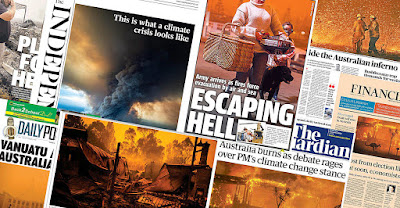A MEDIA
DRIVEN BY SENSATIONALISM
By David Woodbury
Australia has just passed through a bush fire season the
like of which we have never known. Even large cities like Sydney that may be
relatively untouched by the actual bush fires have had their air quality
drastically impacted by the smoke that lingered for weeks. Following hard on
the heels of the bush fires the outbreak of the COVID 19 virus has rocked
the world. One gets the feeling that these events are fodder for a media that
immediately goes into overdrive with sensational reporting.
It may well be that the media outlets compete to see who
can publish the most sensational headline and each headline has to be more
sensational than the previous day. There is a degree of
irresponsibility on the part of the media as to the impact this sort of
sensational reporting has on the general public.
Words like disaster, crisis, emergency,
catastrophic are bandied about with a frequency that is mind-boggling to
the extent that they are beginning to lose their impact and the general
public is becoming desensitised. The old fable of the little boy who
cried wolf tells us that continued level of sensationalism will
eventually desensitise us. Consequently, when the time comes that the
general public should be paying attention, they are so swamped by
sensationalism that they may well be tuned out and deaf to an
important message.
It is not that I want to lessen the importance of the
current COVID 19 virus but it is already evident that much of the
population has been whipped into a frenzy of panic buying by a constant
media barrage. Consequently, we are seeing empty shelves in both food
and medical supplies. Such panic buying, particularly in the area of medical
supplies, may well leave a shortage of necessary material that health
professionals need to counter an epidemic. As a result panic
buying may help to accelerate the spread of the virus.
Media outlets must bear a high degree of responsibility
for the present public panic and perhaps it is timely that the Australian
public looks closely at the ethics of media companies and the accuracy and
balance with which they report the news.
One wonders about the ethics and integrity of media outlets
and even a cursory look at current reporting has examples of
over-sensationalism, e.g.; one TV channel will report: “Channel ## has an
exclusive report on blah, blah, blah”. Chances are that if you
change channels you will get the same exclusive report from a
rival channel, complete with exactly identical video
clips. It must be glaringly obvious to media producers that
their content is not, and never was, exclusive.
The sad fact is that Australia is not well served with a
well-balanced and ethical media mix. Regardless of all the protestations
we get from media companies and the ABC, we have this unsettling feeling that a
lot of what is being fed to us is slanted to suit political or
business interests. In the case of the ABC, the national broadcaster,
there is more than a sneaking suspicion that a leftist agenda is at play.
 |
| ABC newsreader James Dibble |
One cannot ignore the impact of the Internet and social media
in this scenario and you might suspect that at times reporters are drawing on
social media for some of their material. Unfortunately, social media is a
mine of misinformation and fake news. Whenever someone quotes a report from
social media my first question is: who is saying this and is
the source trustworthy and ethical?
As I write this news is to hand that Australian
Associated Press (AAP) will close on June 26 this year. AAP
is an Independent news service used by most media
organisation in Australia. Misha Ketchell, Editor &
Executive Director of The Conversation, commenting on the closure
writes: Now all this careful work will stop, another victim of the new
world created by Facebook and Google in which attention is all that matters and
truth is a virtue sometimes paid in lip service but never dollars.
Sadly, we have to realise that we live in an age where
word spin and outright lies are part and parcel of our information
currency. The reality is that we have to become very astute, wise and
discerning about what we hear and see from all media sources, professional
and otherwise. It is not necessarily true
or authentic because it appears on our TV screens, electronic devices
or printed matter.





Covid19 is a very significant threat. We need to be very alarmed. Not panicking but making significant changes to our lifestyles
ReplyDelete